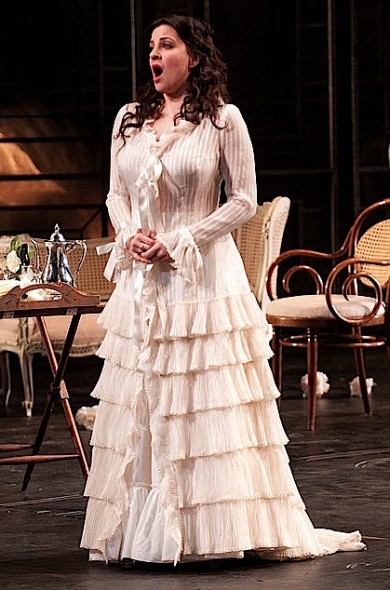Canadian soprano leads a hot-blooded “Traviata” at Palm Beach Opera

Joyce El-Khoury stars as Violetta in Palm Beach Opera’s “La Traviata,” which opened Friday night at the Kravis Center in West Palm Beach. (File photo)
Palm Beach Opera opened its season Friday with a hot-blooded performance of Verdi’s La Traviata, highlighted by visually striking scenic design and the lyric power of Canadian soprano Joyce El-Khoury.
The performance at the Kravis Center in West Palm Beach was the first since the departure of music director Bruno Aprea, after seven years with the company. But under the leadership of conductor Case Scaglione, assistant conductor of the New York Philharmonic, the orchestra provided its usual reliable support to the singers and stepped to the forefront when called upon to deliver passages of dramatic power.
The role of Violetta famously demands an often incompatible combination of vocal abilities—coloratura agility, lyric warmth and dramatic power. While El-Khoury’s coloratura wasn’t delivered with quite the knife-edged precision demanded by her first-act arias, it was serviceable. And she had the dark beauty and richly colored voice to convincingly portray Verdi’s heroine. In the aria Ah, fors’è lui, her introspective phrasing and effortless high notes showed a young woman struggling with whether or not to shed her cynicism about love.
And she brought dramatic intensity to so many passages—her wails of anguish as she watches Alfredo and the Baron compete in the gambling scene, her cry of passion for Alfredo as she prepares to leave him, her pleading dialogue with Alfredo’s father. And finally in the last scene, she brought a smooth legato and desperate warmth to Addio, del passato, her farewell to life and to Alfredo.
The young Russian tenor Georgy Vasiliev turned in a highly uneven performance as Alfredo. His Brindisi was underpowered and flat, with intonation problems, and his Un dì, felice, his declaration of love for Violeta, had all the passion of a report to the shareholders.
But he warmed up by the second act, showing improved technique and greater emotional commitment in De’ miei bollenti spiriti, although for some reason he simply stopped singing in the last lines of O mio remorso, only joining the orchestra for the last note. He brought hot anger to his conflict with the Baron in the gambling scene.
As Alfredo’s father, Giorgio Germont, whose antique ideas of family honor spoil everything for the young lovers, the American baritone Michael Chioldi was an imposing, patriarchal presence, with a voice to match. His long dialogue with Violetta, as he tries to convince her to leave Alfredo, was one of the emotional high points of the opera, with his resonant cries of Piangi, piangi (Weep, weep). His Di Provenza, in which he reminds Alfredo of their family home, was performed with paternal ardor, with a natural feel for the aria’s long lines of melody.
As Baron Douphol, the sugar daddy to whom Violetta defaults after dumping Alfredo, the baritone Jake Gardner was an appropriately stiff-necked, white-haired presence, whose anger at Alfredo put fire into the gambling scene.
Stage direction by the great retired soprano Renata Scotto was natural and subtle. The dissolute aristocrats tottered off stage from the effects of too much wine, but didn’t engage in any of the crude antics with which some directors mar what is, after all, a tale that takes place among the upper classes, no matter how decadent.
Sets from the Utah Symphony & Opera were traditional, yet done with such flair that they became much more than just predictable French interiors. Constructed around dramatically angled walls at the center of the stage, the sets were especially impressive in portraying the party at Flora’s house, flamboyantly hung with dark maroon draperies, and in the final scene, the lonely, gray bed in which Violetta lay dying.
Although this was Scaglione’s first time leading a performance of La Traviata, the musical direction went smoothly. From the ethereal violins tones that open the opera to the crackling energy of the gambling scene, the orchestra turned in a first-class performance. Particularly effective was the great ensemble passage after Alfredo humiliates Violetta by throwing money at her, as chorus, soloists and orchestra joined for a passage that came off with almost violent force.
Palm Beach Opera’s production of La Traviata will be repeated 7:30 p.m. Saturday and 2 p.m. Sunday. For the Saturday performance, the role of Violetta will be sung by Sarah Joy Miller, and the role of Alfredo by David Miller. pbopera.org; 561-833-7888
Posted in Performances
Leave a Comment
Sat Jan 19, 2013
at 3:14 pm
No Comments






